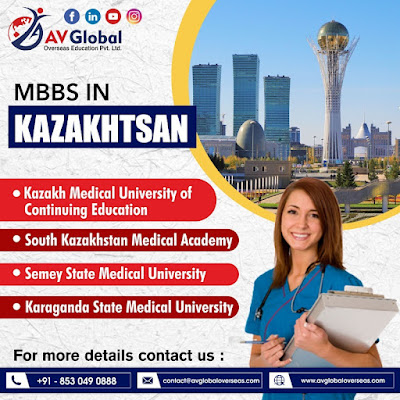Pros and Cons of MBBS Abroad for Indian Students
Pursuing a medical career has always been a dream for many Indian students. With limited seats and fierce competition in medical colleges in India, more and more students are considering studying MBBS abroad. The option of studying medicine in foreign countries has its own set of advantages and disadvantages. In this blog post, we will explore the pros and cons of pursuing MBBS abroad for Indian students.
Pros:
Increased Opportunities: One of the primary advantages of studying MBBS abroad
is the availability of increased opportunities. Many countries, such as the
United States, the United Kingdom, Australia, and Russia, have renowned medical
universities that offer excellent academic programs. Studying abroad opens up
doors to a wider range of educational institutions and provides exposure to
different teaching methodologies and healthcare systems.
Quality Education: Medical universities abroad are often equipped with
state-of-the-art infrastructure, advanced research facilities, and experienced
faculty members. These institutions follow a student-centered approach,
emphasizing practical training and hands-on experience, which can enhance the
overall quality of education. Exposure to diverse patient populations can also
broaden the student's clinical knowledge and skills.
Global Recognition: Many foreign medical universities are globally recognized
and have a strong reputation. Obtaining an MBBS degree from a renowned
international institution can significantly boost the career prospects of
Indian students. The degree is usually recognized by international medical
bodies such as the World Health Organization (WHO) and the National Medical Commission
of India (NMC), which allows students to practice medicine in India after
completing certain licensing requirements.
Lower Competition: The competition for MBBS seats in India is incredibly high,
leading to disappointment and limited options for many deserving students.
Studying abroad offers an alternative route for Indian students to pursue their
medical aspirations without the intense competition. Some countries have a more
lenient admission process and offer opportunities for direct admission based on
academic performance, eliminating the need for entrance examinations like NEET.
Cultural Exposure and Personal Growth: Studying abroad provides a unique
opportunity for Indian students to experience a different culture, interact
with people from diverse backgrounds, and develop a global perspective. Living
independently in a foreign country can foster personal growth, self-reliance,
and adaptability, which are valuable qualities for a successful medical
professional.
Cons:
Cost: One of the primary concerns associated with studying MBBS abroad is the
cost involved. Tuition fees, accommodation expenses, travel costs, and living
expenses can be significantly higher in foreign countries compared to India.
While some universities may offer scholarships or financial aid, it may not be
sufficient to cover all expenses. Students and their families should carefully
consider the financial implications before making a decision.
Language Barrier: Depending on the country and university chosen, the medium
of instruction may not be English. Language barriers can pose challenges in
understanding lectures, participating in clinical rotations, and communicating
effectively with patients. While some universities offer language training
programs, it may take time to adapt and become proficient in the local
language.
Homesickness and Cultural Adjustment: Living away from home in a foreign country
can be emotionally challenging for many students. Being away from family and
familiar surroundings can lead to feelings of homesickness and loneliness.
Additionally, adjusting to a new culture, food, and lifestyle can take time and
may initially cause discomfort.
Licensing and Residency Challenges: After completing MBBS abroad, Indian
students need to clear the Examination FMGE/NEXT conducted by the NMC to
practice medicine in India. The FMGE is a rigorous examination, and the pass
percentage is relatively low. Furthermore, securing a residency position in
India can be competitive, and there may be limited seats available for
foreign-educated medical graduates.
Distinct Healthcare Systems: Each country has its own healthcare
system and medical practices. While studying medicine abroad can provide
exposure to different healthcare systems, it may also mean that the knowledge
and skills acquired may not be directly applicable in India. Indian students
may need to undergo additional training or bridge courses to familiarize
themselves with the Indian healthcare system and its requirements.
In conclusion, pursuing MBBS abroad offers Indian students a
range of opportunities and advantages such as increased options, quality
education, global recognition, and personal growth. However, it is essential to
carefully consider the associated challenges like cost, language barriers,
cultural adjustment, licensing requirements, and differences in healthcare
systems. Students and their families should thoroughly research and weigh the
pros and cons before making a decision. Ultimately, the choice of studying MBBS abroad should align with the student's aspirations, financial
capabilities, and readiness to embrace a new environment.
For
more information about MBBS in Russia or MBBS abroad, contact AV Global
Overseas Education at info@avglobaloverseas.com.
Or call at +918530490888 / +918530450888



Comments
Post a Comment